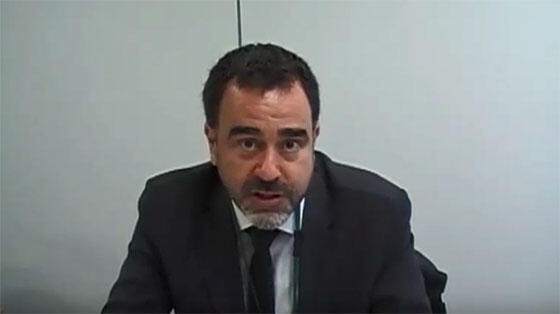Microsoft ends support for Internet Explorer on June 16, 2022.
We recommend using one of the browsers listed below.
- Microsoft Edge(Latest version)
- Mozilla Firefox(Latest version)
- Google Chrome(Latest version)
- Apple Safari(Latest version)
Please contact your browser provider for download and installation instructions.

Relevant SDGs
-

1: NO POVERTY
-

8: DECENT WORK AND ECONOMIC GROWTH
-

10: REDUCED INEQUALITIES
-

17: PARTNERSHIPS FOR THE GOALS
everis provides a wide-range of IT services including consulting, system integration, and outsourcing. Possessing nearshore and offshore business locations in six areas of Spain and South America, it has established a framework for providing high-quality services at low costs. Within this framework, in 2015 it established a digital hub for open-innovation in Chile which will contribute to increased productivity and economic development in the country. We asked Alejandro Moran Marco, Head of Public Sector Americas at everis, to introduce the initiative.
Alejandro Moran Marco
Head of Public Sector Americas everis

Launch of a Digital Hub Initiative Following the Inauguration of a New Government in 2014
In March 2014, the Republic of Chile inaugurated a new government. Shortly after assuming her position, new president Michelle Bachelet presented congress with important legislation proposals for taxation system reform, electoral system reform, and education system reform among others, and announced an agenda concerning productivity enhancement and economic development. In response to this, we at everis launched our digital hub initiative. We thought that if we could generate IT and software innovation to create world-class software, it would lead to solutions for the issues facing Chile. Also, if we recruited graduates from local universities to work in the hubs, this would result in job creation.

We quickly proposed our digital hubs for open innovation initiative to the government and local universities and they agreed to participate. In 2015 we moved into the implementation stage of the initiative and formed strong alliances with universities and regional governments. We also chose the city of Temuco as a location for establishing a digital hub. One of the reasons for this is that Temuco is located in the Araucanía Region, 800km away from Chile's capital of Santiago. The Araucanía Region is a poor region with an economy centered around primary industries, such as agriculture and fishing, and we wanted to improve lives there through a digital hub. Another reason was that one of the universities in Temuco became actively engaged in the project and agreed to provide personnel.
Advancing research and development on the themes of healthcare, education, logistics, and trade
As the digital hubs are a cooperative effort between everis, the government, and universities, we narrowed down the fields for advancing research and development into four themes - healthcare, education, logistics, and trade. For example, in the healthcare field, we are developing a genomic health record. This involves research aimed at realizing personalized medical treatments. If we make a patient's genetic information available during diagnoses, it will enable doctors to prescribe treatments that are effective for that individual. Also, in the trade field, we are working on developing integrated information systems that can be used in Chile's ports, based on examples of best practice for these system from Japan. In this way, the digital hub is prioritizing its focus on meeting the needs of the public.
The digital hubs also play a role in promoting open innovation, so we built a mechanism in which the government identifies an issue and then we consider measures for solving it, create trial products, hold trials in places such as hospitals, schools, or ports, and then share the benefits of this research through the technology or service created. These efforts have been well received and we were presented with the Best Social ICT Initiative award for 2016 from the Asociación Chilena de Tecnologias de Informacion (ACTI - an association of leading Chilean IT companies).

Employing Around 350 Local People and Providing Language as Well as Technology Training
In the two and a half years in which the digital hub has been operating, we have employed around 350 local people, of which around 150 are graduates from local universities. Our goal is to increase the number of personnel to 900 over the next four or five years. Our personnel are working on IT projects aimed at Europe and Chile, as well as other Latin American countries and the US. As English is not a native language in Chile, we hold regular training on subjects such as English conversation to enable our IT engineers to use English correctly.

In 2017 we established a new digital hub called the Healthcare Digital Hub in Concepcion, a city about three hours away from Temuco. As the name suggests, it specializes in IT related to healthcare services. We are also considering building a digital hub in the Argentinian city of Mendoza. In doing this, our goal is to create a network of digital hubs throughout Latin America.
These digital hubs provide great opportunities for people living in regions other than major cities, such as Temuco and Concepcion. I also strongly believe we can realize world class IT innovation at the same time. This is because the people involved have a dream and continue to bring passion to the project. My dream is to build a Latin American network, starting with the digital hubs, and use it to create a better environment in Latin America.

















